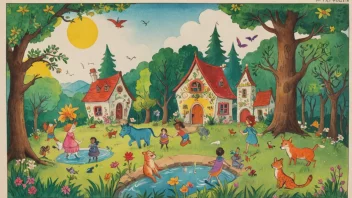Introducing your child to the world of reading at an early age can set the foundation for a lifelong love of books and knowledge. The journey of reading is not just about learning to decode words; it's about sparking imagination, fostering creativity, and developing critical thinking skills. With the right approach, you can make reading an enjoyable and enriching experience for your child. Here are some effective strategies to help you introduce your little one to the magical realm of stories and literature.
Start with Picture Books
Picture books are an excellent way to introduce your child to reading. Their colorful illustrations and engaging narratives capture young minds and make reading enjoyable. When selecting picture books, look for those that are age-appropriate and have relatable themes. Some popular options include:
- "The Very Hungry Caterpillar" by Eric Carle - A delightful tale of transformation.
- "Brown Bear, Brown Bear, What Do You See?" by Bill Martin Jr. - A rhythmic story that helps with color recognition.
- "Goodnight Moon" by Margaret Wise Brown - A soothing bedtime read that introduces routine.
Read these books aloud to your child, pointing to the pictures and encouraging them to guess what happens next.
Establish a Reading Routine
Creating a consistent reading routine can help instill a love for reading in your child. Set aside a specific time each day for reading, whether it's during the day or as part of their bedtime ritual. This consistency not only builds anticipation but also reinforces the idea that reading is a valuable and enjoyable activity. You might consider:
- Reading for 15-20 minutes each night before bed.
- Encouraging your child to choose their books.
- Using weekends for longer, more immersive reading sessions.
As your child grows, you can gradually increase the reading time and complexity of the books.
Engage in Storytelling
Storytelling is a powerful tool that complements reading. It allows you to enhance your child's imagination and narrative skills. You can tell stories from your own experiences or create imaginary tales together. Here’s how to make storytelling interactive:
- Encourage your child to contribute characters or plot twists.
- Use props or puppets to bring the story to life.
- Invite your child to narrate their own stories and share them with family.
Storytelling not only promotes creativity but also reinforces the narrative structure found in books.
Visit the Library Together
Libraries are treasure troves of books waiting to be explored. Regular visits to the library can help your child discover new genres and authors while also developing a sense of independence in choosing what they want to read. Consider these tips for a successful library visit:
- Make a list of books or genres your child is interested in exploring.
- Participate in library events, such as storytime or book clubs.
- Allow your child to borrow books that pique their interest, even if they're slightly above their reading level.
The library can become a favorite destination, fostering a sense of community around reading.
Lead by Example
Your own reading habits can greatly influence your child's attitude towards books. Make reading a visible part of your daily life. Here are some ways to show your child that reading is important:
- Keep books accessible throughout the house.
- Share what you're reading and discuss it with your child.
- Invite your child to join you in reading magazines or newspapers.
When children see their parents engaged in reading, they are more likely to develop a similar interest.
In conclusion, introducing your child to reading at an early age is a rewarding endeavor that can shape their future. By starting with picture books, establishing a reading routine, engaging in storytelling, visiting the library, and leading by example, you can cultivate a love for reading that lasts a lifetime. Remember, the key is to make reading a fun and integral part of your child's daily life, transforming it into an adventure filled with stories and imagination.






